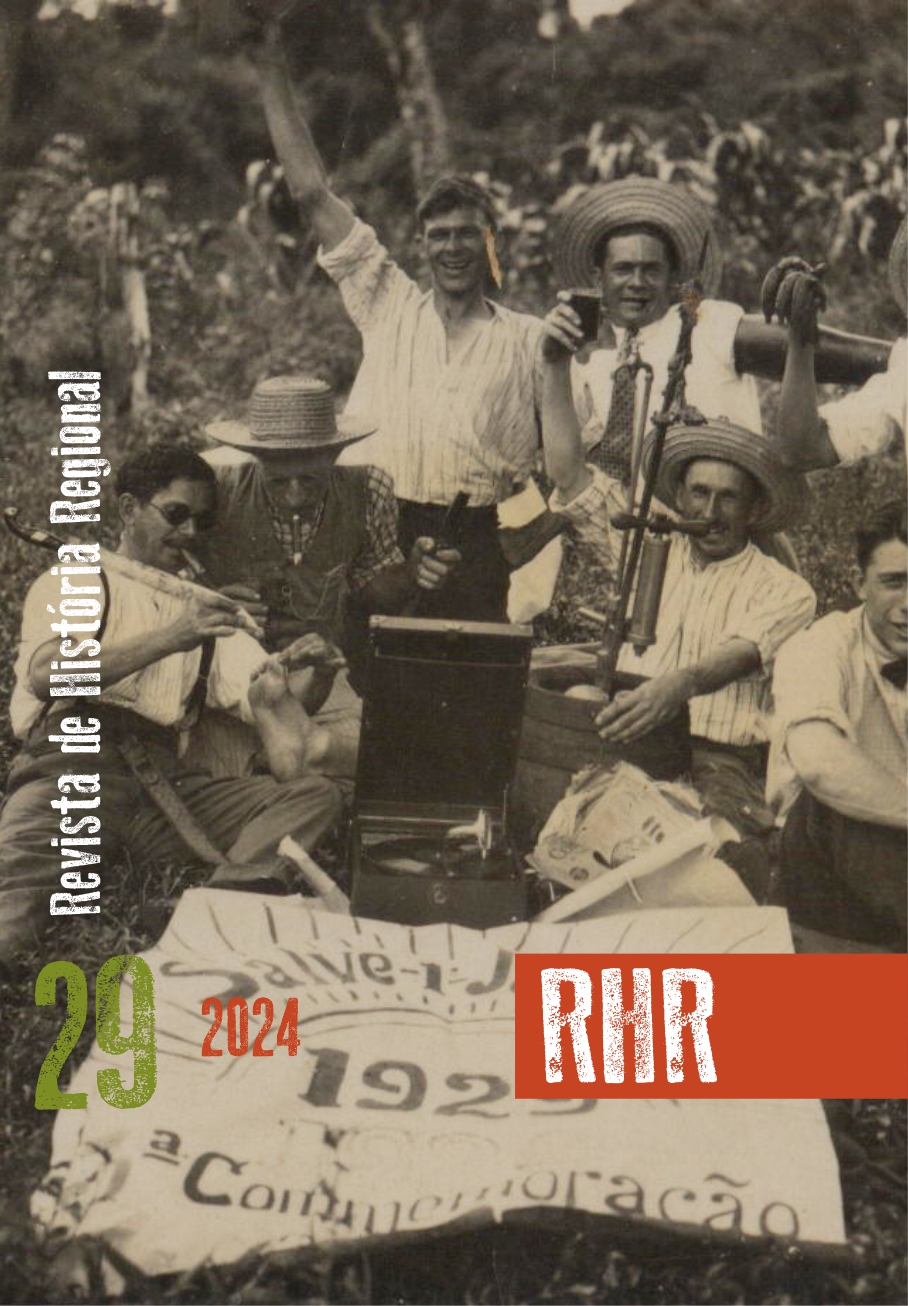Eugenics, Hygienism and Racism in Portugal in the first half of the twentieth century
DOI:
https://doi.org/10.5212/Rev.Hist.Reg.v.29.23742Keywords:
Eugenics, Hygienism, Racism, Modernization, ColonialismAbstract
This paper aims to highlight the influence and dissemination of eugenics, hygienist and racist conceptions in Portuguese society in the first half of the twentieth century. However, eugenicist theories and practices have never been strong enough to have translated, as has happened in other European countries, into the institutionalization of radical eugenic measures. The hygienist tradition, Catholic opposition and the reduced acceptance of eugenics in liberal conservative and progressive circles in Portugal ended up conditioning the reception of eugenic theories and practices in the country. This reality, similar in many respects to what has occurred in other Latin countries of Catholic origin, nevertheless has some specific characteristics that require explanation. In particular, the singularities of the relations between science, society and political projects at the time of the reception of the different models of eugenics. The methodology used was essentially analytical-bibliographic.
Downloads
References
ALLEN, Garland E. «Eugenics and Modern Biology: Critiques of Eugenics, 1910-1945» In Annals of Human Genetics, 2011, n. 75, p. 314.
ALMEIDA, Miguel Vale de. «Longing for oneself: hybridism and miscegenation in colonial and postcolonial Portugal» In Etnográfica, v. 1, 2002, pp. 181-200.
AMARO, António Rafael. A Revista Seara Nova nos anos vinte e trinta: Memória, Cultura, Poder (1921-1939). Viseu: Universidade Católica Portuguesa, 1995.
BASHFORD, Alison; LEVINE; Philippa (Eds.). The Oxford Handbook of the History of Eugenics. Oxford: Oxford University Press, 2010.
CATROGA, Fernando. Antero de Quental. História. Socialismo. Política. Lisboa: Editorial Notícias, 2001.
CLEMINSON, Richard. «Eugenics in Portugal, 1900–1950: setting a research agenda» In East Central Europe, v. 38 n. 1, 2011, pp. 133-154.
_______. Catholicism, Race and Empire. Eugenics in Portugal, 1900-1950. Budapest: Central European University Press. 2014.
_______. «Between Germanic and Latin eugenics: Portugal, 1930-1960» In História, Ciências, Saúde – Manguinhos, Rio de Janeiro, v.23, supl., dez. 2016, pp. 73-91.
FITAS, Augusto; PRÍNCIPE, João (Eds). A Seara Nova e os Debates Contemporâneos. Lisboa: Caleidoscópio, 2022.
FOUCAULT, Michel. Microfísica do Poder. 23, Ed. S. Paulo, Graal, 2004.
GIESBRECHT, Daniel F. «Divus contra Galton: o debate eugênico a partir da produção intelectual católica brasileira na década de 1930» In ARIES. Anuario de Antropología Iberoamericana, pp: 1-6, 2023.
KEVLES, Daniel J. In the Name of Eugenics: Genetics and the Uses of Human Heredity. Cambridge: Harvard University Press, 1995.
MATOS, Patrícia Ferraz de. «Aperfeiçoar a “raça”, salvar a nação: eugenia, teorias nacionalistas e situação colonial em Portugal» In Trabalhos de Antropologia e Etnologia, 50, 2010, pp. 89-111.
_______. Anthropology, Nationalism and Colonialism: Mendes Correia and the Porto School of Anthropology. Oxford-Nova Iorque: Berghahn Books, 2023.
NINHOS, Cláudia. «A discussão em torno da eugenia em Portugal» In PIMENTEL, Irene Flunser; NINHOS, Cláudia. Salazar, Portugal e o Holocausto. Lisboa: Temas e Debates, 2013, pp. 209-242.
NOVIDADES, n.º 11 759, 24 de junho, 1933, p. 1.
PEREIRA, Ana Leonor. Darwin em Portugal (1865-1914). Filosofia. História. Engenharia Social. Coimbra: Livraria Almedina, 2001.
_______. «Eugenia em Portugal?» In Revista de História das Ideias, Vol. 20, 1999, pp. 531-60.
PIMENTEL, Irene Flunser. «A assistência social e familiar do Estado Novo nos anos 30 e 40» In Análise Social, n.151-152, 1999, pp. 477-508.
_______. «O aperfeiçoamento da raça: a eugenia na primeira metade do século XX» In História, n.3, 1998, pp. 18-27.
PINTO, António Costa. «A Formação do Integralismo Lusitano, 1907-1917» In Análise Social, Vol. XVIII (72-73-74), 1982, pp. 1409-1419.
PIO XI. Carta encíclica casti connubii do Papa Pio XI sobre o matrimónio Cristão.
PORTUGAL. Portaria 7948, Diário do Governo, I Série, n.º 293, de 14 de dezembro de 1934. (https://files.diariodarepublica.pt/gratuitos/1s/1934/12/29300.pdf)
STEPAN, Nancy Leys. «Eugenia no Brasil, 1917-1940» In HOCHMAN, Gilberto; ARMUS, Diego (Orgs). Cuidar, Controlar, Curar. Ensaios Históricos sobre Saúde e Doença na América Latina e Caribe [online]. Fiocruz, Rio de Janeiro, pp. 330-391.
TURDA, Marius. Modernism and Eugenics. Basingstroke: Palgrave Macmillan, 2010.
TURDA, Marius; GILLETTE, Aaron. Latin Eugenics in Comparative Perspective. London: Bloomsbury, 2014.
WEBER, Maria Julieta. «Eugenia Latina em Portugal e no Brasil (primeira metade do século XX)» In Trabalhos de Antropologia e Etnologia, vol. 63, 2023, pp. 205-217.
WEINGART, P. «Science and Political Culture. Eugenics in Comparative Perspective» In Scandinavian Journal of History, vol. 24, 2, 1999, pp. 163-177.
Published
How to Cite
Issue
Section
License
Copyright (c) 2024 António Rafael Amaro Amaro

This work is licensed under a Creative Commons Attribution 4.0 International License.
Autores que publicam nesta revista concordam com os seguintes termos:
a) Os autores mantêm os direitos autorais e concedem à revista o direito de primeira publicação, com o trabalho simultaneamente licenciado sob a Creative Commons Attribution License que permite o compartilhamento do trabalho com reconhecimento da sua autoria e publicação inicial nesta revista.
b) Os autores são autorizados a assinarem contratos adicionais, separadamente, para distribuição não exclusiva da versão publicada nesta revista (por exemplo, em repositórios institucionais ou capítulos de livros), com reconhecimento da sua autoria e publicação inicial nesta revista).
c) Os autores são estimulados a publicar e distribuir a versão onlline do artigo (por exemplo, em repositórios institucionais ou em sua página pessoal), considerando que isso pode gerar alterações produtivas, bem como aumentar o impacto e as citações do artigo publicado.
d) Esta revista proporciona acesso público a todo o seu conteúdo, uma vez que isso permite uma maior visibilidade e alcance dos artigos e resenhas publicados. Para maiores informações sobre esta abordagem, visite Public Knowledge Project, projeto que desenvolveu este sistema para melhorar a qualidade acadêmica e pública da pesquisa, distribuindo o OJS assim como outros softwares de apoio ao sistema de publicação de acesso público a fontes acadêmicas.
e) Os nomes e endereços de e-mail neste site serão usados exclusivamente para os propósitos da revista, não estando disponíveis para outros fins.

Este obra está licenciado com uma Licença Creative Commons Atribuição 4.0 Internacional.

Este obra está bajo una licencia de Creative Commons Reconocimiento 4.0 Internacional.






